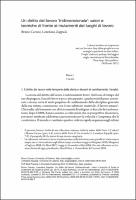Chapter Un diritto del lavoro ‘tridimensionale’: valori e tecniche di fronte ai mutamenti dei luoghi di lavoro
Author(s)
Caruso, Bruno
ZAPPALA', Loredana Enza
Language
ItalianAbstract
The essay analyses the changes in labour law by examining working places’ modifications induced by the most meaningful driver: technology. In this perspective, the authors point out three macro scenarios. The first relates to industry 4.0 and to the notion of “cognitive enterprise”. This could, or should, act as a magnet model considering its social and organizational positive consequences. The second is the traditional work organization re-considered in the light of new technologies’ impact; it generates a kind of neo digital Fordism, as does the Amazon model in the logistic sector. The third scenario is linked to the rise of the gig economic, with its “workers on tap” (i.e. the platform economy with the algorithm as a boss). These different scenarios, even if characterised by blurred borders, imply the need to think of Labour law differently than in the past. Beyond its traditional protective function, there should be a promotional one, aimed at developing capabilities and positive liberties of the person in the workplace. In the face of this three-fold dimension of the workplaces and of the expansion of Labour law functions, it is also necessary to rethink its techniques and principles. In that sense, the authors propose a different regulatory perspective: no more rigid and uniform rules, as happened in the “short century”, but a regulation made by differentiation, adaptations, extensions, dilutions. With a unifying value: the reference to the individual, to her/his life project, and ultimately to her/his dignity.


 Download
Download Web Shop
Web Shop